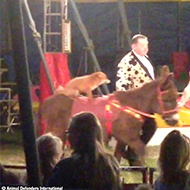
Committee agrees "general principles" of bill
The National Assembly’s climate change, environment and rural affairs committee has backed proposed legislation by the welsh government to ban the use of wild animals in travelling circuses. In a report published on Friday, the committee scrutinised the Wild Animals and Circuses (Wales) Bill.
The bill, which was introduced in July, currently has a planned implementation date of 1 December 2020, but Animal Defenders International (ADI) is urging assembly members to bring forward the ban, so that the suffering of the animals ends sooner.
In the report, the committee recommends that:
- The assembly agrees the “general principles of the bill”
- The Minster provides a “more comprehensive” explanation about the scope of the bill and the ethical arguments behind it
- The bill is amended to include the availability of statutory guidance to support the implementation of the ban and that that guidance is clear on specific terms and procedures
- The Welsh government discuss available support and advice concerning re-homing options with Defra.
In a public consultation about the bill, 97 per cent of respondents agreed that it should be made an offence for wild animals to be used in a travelling circus. The constant travel and lack of appropriate facilities in circuses mean that animal welfare is inevitably compromised.
Currently, two travelling circuses are planning to tour with wild animals following the ban. ADI is urging these circuses to allow the animals to be re-homed to suitable sanctuaries, which would resolve possible enforcement issues with the ban and ensure the well-being of the animals is upheld.
Image (c) Animal Defenders International



 BSAVA is to partner with BVA Live (11-12 June 2026) to champion clinical research.
BSAVA is to partner with BVA Live (11-12 June 2026) to champion clinical research.